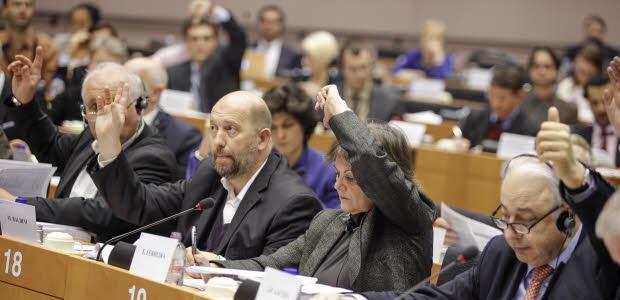
Economic and Monetary Affairs MEPs voted for more open and competitive payment services sector in the EU, with strong defenses against fraud and data breaches. Payment service users to be better protected from fraud and misuse of their data. All fees and charges for payment services should be transparent. Level playing field between banks and non-bank payment service providers. Provisions to ensure a better access to cash, especially in remote or rural areas.
MEPs’ changes to the Payment services regulation were adopted with 39 votes to 1 and 3 abstentions. The regulation should provide more harmonisation in the EU for payment and electronic money services. It applies to banks, post office giro institutions and payment institutions.
Security of transfers
MEPs agreed that the unique identifier (a combination of letters, numbers or symbols specified by a PSP or a user, such as IBAN) should be verified free of charge for credit transfers. Moreover, PSPs should ensure strong customer authentication based on the use of two or more elements categorised as knowledge, possession or inherence and on a risk assessment.
Where a PSP fails to have in place the appropriate fraud preventing mechanisms it will be responsible for covering customer’s losses resulting from fraud. Technical service and IT solution providers could also be held responsible for damages (up to the transaction amount) caused by a failure, within the remit of their contract. Finally, online platforms would be liable if they were informed about fraudulent content on their platform and did not remove it.
The new text expands the right to refund to cases of “spoofing” where fraudsters pretend to be from a customer’s bank. MEPs extended that right to cases where fraudsters pretend to be from other types of organisation.
MEPs also called for Member States to invest substantial means in education on payment-related fraud, through a media campaign or lessons at schools.
Security of data
When provision of payment services entail the processing of personal data, MEPs want it to carried out only with the permission of the customer. Customers should be also able, through a dedicated dashboard, to opt-out from data sharing with third parties in a general way for all present and future data access permission requests and to withdraw access to their data.
Transparent charges
Customers should be informed about all charges prior to the initiation of the payment transaction, in a clear, transparent and accessible format. They should get, for example, information about currency conversions charges or any fixed fees for cash withdrawal.
The Payment services directive was adopted with 37 votes to 1 and 6 abstentions. The new directive should provide a level playing field for all PSPs, secure and efficient digital payments and better access to cash, especially in remote areas.
Better access to cash
In order to make assure better access to cash, especially in remote or rural areas, retail stores providing cash independently from a purchase (up to EUR 100) should be exempt from the rules. Similarly, ATMs that enable cash withdrawals but do not service payment accounts should be subject to a lighter registration process.
New types of payment services
MEPs agreed that new players should be able to enter the EU payment services sector, subject to authorisation based on strict and comprehensive conditions. The same conditions should apply Union-wide to the activity of providing payment services, including electronic money services and the legislation should remain technology neutral.
Considering the rapid evolution of the retail payment market and the constant new offering of payment services and solutions, it was appropriate to adapt and clarify some definitions, including the definition of “payment account”, which is now defined as an account used for both sending and receiving funds to and from third parties.
Authorisation process
All undertakings intending to provide payment services or electronic money services will have to apply for an authorisation. Such an application should among others contain business plan and set out the type of payment services envisaged as well as security, data protection and governance arrangements and a winding-up plan in case of failure. In order to cover the risks posed by their activities, PSPs will need to hold minimum initial capital between EUR 50 000 and EUR 350 000 depending on the type of services they provide. MEPs agreed that existing payment and e-money institutions will not have to seek a new authorisation under the directive, but would follow a simplified process with their competent authority.
Quotes
Marek BELKA (S&D, PL) – responsible for the regulation said:
“With the Parliament’s proposal we put the citizen in the centre, while – at the same time – outlining a framework for a true level-playing field in the European Single Market for payments. The Regulation touches upon various points, from more complicated issues such access to information by fintechs to topics that we may come across each day, such as payment fraud or transparency of information in ATMs. We cover it all by expanding and supporting the Commission’s proposal.„
Ondřej KOVAŘÍK (Renew, CZ) – responsible for the directive said:
“For Parliament, it is important to have a smooth transition from PSD II to the upgraded Payments Package. Parliament’s position will ensure certainty and lower the burden for both PSPs and national competent authorities, particularly avoiding potentially cumbersome reauthorisation processes. Importantly, we have doubled the cash limit for withdrawals of cash at retail stores. The aim is to support and expand the Commission proposal, confirming that cash will be available and accessible, in particular for customers in rural areas with fewer ATMs or card payment facilities.”
Next steps
Plenary is expected to vote on both text during the first plenary session in April, to close the first reading without agreement with Council. Negotiations between Parliament and Council are then expected to start after the elections.
Banking 4.0 – „how was the experience for you”
„To be honest I think that Sinaia, your conference, is much better then Davos.”
Many more interesting quotes in the video below: